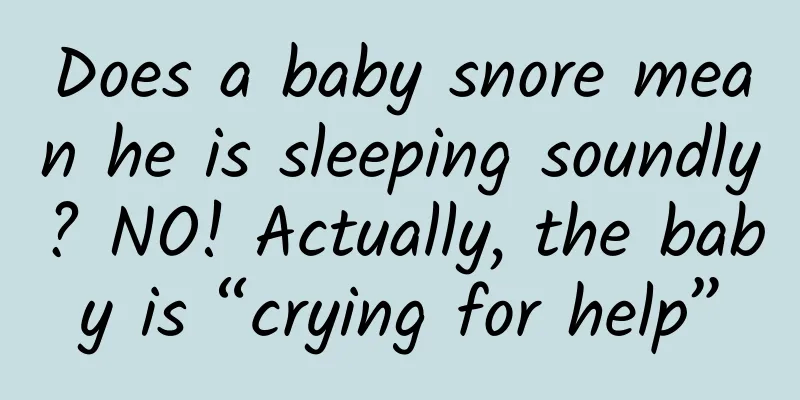Does a baby snore mean he is sleeping soundly? NO! Actually, the baby is “crying for help”

|
Many parents think that their children’s snoring is hereditary and a sign of a good sleep, and do not take their children’s snoring seriously. Director Peng Bo of the Otolaryngology Department of Hunan Provincial Hospital of Integrated Traditional Chinese and Western Medicine (Affiliated Hospital of Hunan Institute of Traditional Chinese Medicine) reminds you that children’s snoring is not because the child is sleeping soundly, but because the child’s body is sending a “help” signal to the parents: enlarged adenoids cause brain hypoxia. 1. How does snoring occur?When a child is sleeping, if the respiratory tract is blocked or narrowed, the flow of air through the respiratory tract will be obstructed, causing the soft tissue in the throat to vibrate and make a sound, which is called "snoring". The narrower the airway, the louder the "snoring" and the more severe the child's brain oxygen deprivation. The most common cause of airway obstruction in children is enlarged adenoids. 2. What are adenoids?The adenoids are located in the nasopharynx at the back of the nasal cavity. They are the body's immune organs. Under normal physiological conditions, they grow to their largest size at the age of 6-7 and gradually shrink after puberty. If the adenoids proliferate excessively and cause corresponding symptoms, it is called adenoid hypertrophy, which is a pathological phenomenon and a common disease in children aged 3 to 10 years old. 3. What effects does adenoids hypertrophy have on children?The adenoids are located in the ear, nose, and throat. When enlarged adenoids block the Eustachian tubes on both sides, it can cause secretory otitis media, with symptoms of stuffy ears and hearing loss. When the enlarged adenoids block the posterior nostril, nasal secretions accumulate and are difficult to blow out, causing sinusitis in children, with symptoms of nasal congestion and runny nose, accompanied by symptoms such as open mouth breathing, nasal tinnitus when speaking, and snoring during sleep. Long-term nasal congestion can cause brain hypoxia, resulting in children's inattention, poor academic performance, and even affecting their growth and development. Long-term mouth breathing can cause developmental disorders of the facial bones in children, such as elongated maxilla, high arched hard palate, protruding upper incisors, uneven dentition leading to malocclusion, drooping mandible, thick lips, upturned upper lip, coupled with mental depression and dull facial expressions, which is the so-called adenoid facies. Nasal secretions flow downward, irritating the respiratory mucosa, causing coughing and easily leading to bronchitis. 4. Is surgery necessary for adenoids hypertrophy?The answer is: not necessarily. Director Peng Bo of the Department of Otolaryngology at Hunan Provincial Hospital of Integrated Traditional Chinese and Western Medicine (Affiliated Hospital of Hunan Institute of Traditional Chinese Medicine) introduced: 1. Physiological adenoid hypertrophy It usually does not affect the child's physical health and does not require surgical treatment. For most children, the adenoids will gradually shrink and disappear after the age of 10. 2. Pathological adenoid hypertrophy If it is caused by acute inflammation, this short-term hypertrophy will recover after the inflammation is controlled. For this type of adenoid hypertrophy caused by acute inflammation, after one or two courses of nasal fumigation and washing with special Chinese medicine formulas of the Department of Otolaryngology, significant recovery can be achieved. When a child has repeated inflammation and the adenoids continue to proliferate and hypertrophy and cannot recover, causing nasal congestion, runny nose, snoring or mouth breathing, the Otolaryngology Department of Hunan Provincial Hospital of Integrated Traditional Chinese and Western Medicine (Affiliated Hospital of Hunan Institute of Traditional Chinese Medicine) has a systematic treatment plan combining traditional Chinese and Western medicine. For children who need surgery, surgical treatment is adopted at the appropriate time to restore the patency of the child's nasal cavity; after the operation, Chinese medicine is used in combination with syndrome differentiation to regulate the spleen and stomach function, enhance the child's resistance, and can significantly reduce the recurrence rate; nasal fumigation and washing are performed with special Chinese medicine, and multiple diseased parts of the child are treated simultaneously. Compared with Western medicine antibiotics, glucocorticoids, leukotriene receptor antagonists and other drug treatments, this method has obvious advantages such as rapid onset of action, stable efficacy, safety and no side effects. Director Peng Bo of the Otolaryngology Department of Hunan Provincial Hospital of Integrated Traditional Chinese and Western Medicine (Affiliated Hospital of Hunan Institute of Traditional Chinese Medicine) reminds parents that winter and spring are the peak seasons for the onset of adenoids hypertrophy in children. Early detection and correct treatment can eliminate the "snoring" and allow children to breathe freely and have a good sleep.
(Edited by ZS) |
Recommend
It feels like there are more and more cancer patients. Is this a real trend or a perception bias?
You may have noticed that recently there are freq...
How to deal with female bloody leucorrhea?
Women's health is often affected by menstruat...
What are the harms of eating too many potato chips to the body? Are potato chips a food that can cause allergies?
Potato chips are made from potatoes, which are he...
What kind of exercises are suitable for menstruation?
During menstruation, women should pay attention t...
Why do pregnant women get hungry quickly?
It could be low blood sugar levels. The blood sug...
Benefits of Spirulina for Women
Spirulina is a nutritious seafood with many funct...
What should women do if they have insufficient Qi and blood?
Female friends often lack qi and blood in their b...
How to take calcium tablets and folic acid properly
In order to prevent the baby from having deformit...
What are the symptoms of insufficient milk supply?
Breast milk is the most natural and safest food i...
Can I eat popsicles while breastfeeding?
You cannot eat popsicles during breastfeeding bec...
What causes odor during menstruation?
Many women face different problems during their m...
The average life expectancy of this disease is only 3 to 5 years. If you experience these symptoms, be alert to ALS!
This disease is called “The first of the world’s ...
Can gout patients eat tofu?
When I eat out, I often hear people at the same t...
Anti-aging cream has no effect? Here's how to use it
Many girls use anti-aging cream to scoop out a lu...









